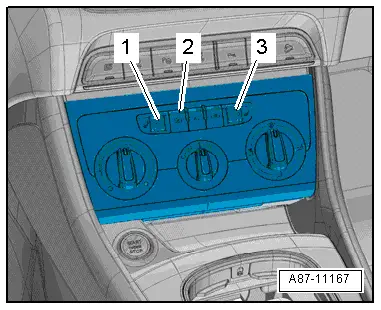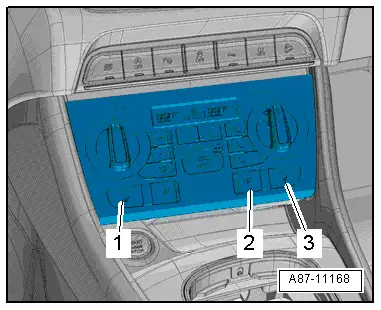Audi Q3: Seat Heating
Vehicles with Manual Climate Control System (Heater without A/C System)
Components which participate in the activation of the seat heating
The A/C Control Module -J301- (the Heater Control Module -J65-) control head does not directly activate the seat heating. Depending on the setting on the Heated Driver Seat Adjuster -E94- and the Heated Front Passenger Seat Adjuster -E95-, the A/C Control Module A/C Control Module -J301- (the Heater Control Module -J65-) sends the request to switch on the seat heating to the Front Seat Heating Control Module -J774- via voltage signals. The Front Seat Heating Control Module -J774- then activates the seat heating. Refer to → Wiring diagrams, Troubleshooting & Component locations.
Procedure
- Adjust the seat heating via the thumbwheels -1 and 3- on the A/C Control Module -J301- (the Heater Control Module -J65-) control head.
- On vehicles with a Start/Stop System, the seat heating can be switched off for the time in which the stop function is active (by the Vehicle Electrical System Control Module -J519- to protect the Battery -A-). However, the setting for the activation of the heated seats remains the same in the A/C Control Module -J301- (Heater Control Module Heater Control Module -J65-) control head. After the engine was restarted via the start function, the heated seats are switched on again. Refer to Vehicle Diagnostic Tester in the "Guided Fault Finding" function for the Vehicle Electrical System Control Module -J519-.
- Depending on the vehicle, the seat heating setting may be automatically reduced by the Front Seat Heating Control Module -J774- after running a certain amount of time (for example, after 10 minutes). Refer to the Owner's Manual.
 Note
Note
- The seat heating setting is adjusted on the A/C Control Module -J301- (the Heater Control Module -J65-) via the Heated Driver Seat Adjuster -E94- and the Heated Front Passenger Seat Adjuster -E95-. This setting is transmitted to the Front Seat Heating Control Module -J774-. The specified temperatures for the different seat heating settings are stored in the Front Seat Heating Control Module -J774-. Depending on the Front Seat Heating Control Module -J774- version, the specified temperature for the seat heating can therefore be different for the same setting on the A/C Control Module -J301- (the Heater Control Module -J65-) control head. Refer to → Wiring diagrams, Troubleshooting & Component locations.
- No diagnosis is possible for the activation of the seat heating in the A/C Control Module -J301- (in the Heater Control Module -J65-) and in the Front Seat Heating Control Module -J774-.
- If there is a condition in which the driver or front passenger seat heating cannot be switched on (for example, short circuit in the power supply to the respective control module, etc.), it is not stored as a malfunction in the A/C Control Module -J301- (in the Heater Control Module -J65-) and in the Front Seat Heating Control Module -J774-.
- If however, for example, the measured voltage at the Vehicle Electrical System Control Module -J519- at terminal "30" falls below a value stored in the Vehicle Electrical System Control Module -J519-, the seat heating output is reduced or switched off completely so that the load on the Generator -C- is reduced. Refer to Vehicle Diagnostic Tester in the "Guided Fault Finding" function for the Vehicle Electrical System Control Module -J519-.
- Check the seat heating function and service it. Refer to → Body Interior; Rep. Gr.74; Front Seat Covers and Cushions; Overview - Seat Heating Element and → Wiring diagrams, Troubleshooting & Component locations.

Vehicles with Automatic Climate Control System
Components which participate in the activation of the seat heating
The Climatronic Control Module -J255- control head directly activates the seat heating. Refer to Vehicle Diagnostic Tester in "Guided Fault Finding" function and → Wiring diagrams, Troubleshooting & Component locations.
Procedure
- The seat heating is adjusted via the buttons -1 and 3- on the Climatronic Control Module -J255- control head.
- When the seat heating is switched on, the function indicator lamps in the buttons illuminate. Refer to the Owner's Manual.
- For vehicles with a Start/Stop System, the seat heating can be switched off for the time in which the stop function is active (to protect the Battery -A-). The setting for the activation of the heated seats remains stored, however, in the Climatronic Control Module -J255- control head. After the engine was started again via the start function, the seat heating is switched on again. Refer to Vehicle Diagnostic Tester in the "Guided Fault Finding" function.
- The set seat heating level for the driver seat can be stored in the Climatronic Control Module -J255- in a key-dependent manner. The settings made prior to the ignition being switched off are applied during the next driving cycle. Refer to Operating Instructions.
- For vehicles without the passenger occupant detection system for the front passenger seat and rear seats, the seat heating is currently not shut-off automatically by the Climatronic Control Module -J255- if a seat is unoccupied while driving. If the ignition is turned off and not turned on again within approximately 10 minutes, the setting for the seat heating activation is erased. Refer to the Owner's Manual.
- Depending on the vehicle, the seat heating setting may be automatically reduced by the Climatronic Control Module -J255- after running a certain amount of time (for example, after 10 minutes). Refer to the Owner's Manual.
 Note
Note
- The seat heating level is set on the Climatronic Control Module -J255-. The specified temperatures for the different seat heating settings are stored in the Climatronic Control Module -J255-. Depending on the Climatronic Control Module -J255- version, the specified temperature for the seat heating can therefore be different for the same setting on the control head. Refer to Vehicle Diagnostic Tester in the "Guided Fault Finding" function and → Wiring diagrams, Troubleshooting & Component locations.
- Depending on the vehicle version and equipment, the various information regarding seat heating activation (the setting transmitted by the Climatronic Control Module -J255- control head, the target and actual temperature of the seat, etc.) is displayed in different measured value blocks in various control modules. Refer to Vehicle Diagnostic Tester in the "Guided Fault Finding" function.
- If there is a condition in which the driver or front passenger seat heating cannot be switched on (for example, short circuit in the power supply to the respective control module, etc.), it is stored as a malfunction in the Climatronic Control Module -J255- (depending on the vehicle version and equipment level). For this vehicle, information stating that the DTC memory in the relevant control module must to be read out may not be sent via the data bus to the Climatronic Control Module -J255- control head. Refer to Vehicle Diagnostic Tester in the "Guided Fault Finding" function. In the event of a complaint regarding seat heating, first read the Diagnostic Trouble Code (DTC) memory of the control modules that can affect the seat heating activation (for example, the Vehicle Electrical System Control Module -J519-).
- The function test for the heated seat activation is described. Refer to Vehicle Diagnostic Tester in the "Guided Fault Finding" function.
- If, for example, the voltage at terminal "30" measured at the Vehicle Electrical System Control Module -J519- falls below a value stored in the Vehicle Electrical System Control Module -J519-, the seat heating output is reduced or switched off completely in order to reduce the load of the Generator -C-. Refer to Vehicle Diagnostic Tester in the "Guided Fault Finding" function.
- In the "read measured values" function of the Guided Fault Finding, the Climatronic Control Module -J255- control head displays which seat heating level setting has been selected. The seat heating activation, the actual and target seat temperature, the actual current supplied to the seat heating, etc. are displayed in the "Read measured values" function, depending on the vehicle version and equipment. Refer to Vehicle Diagnostic Tester in the "Guided Fault Finding" function.


